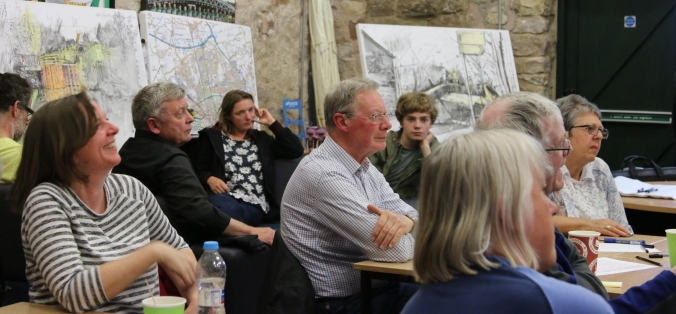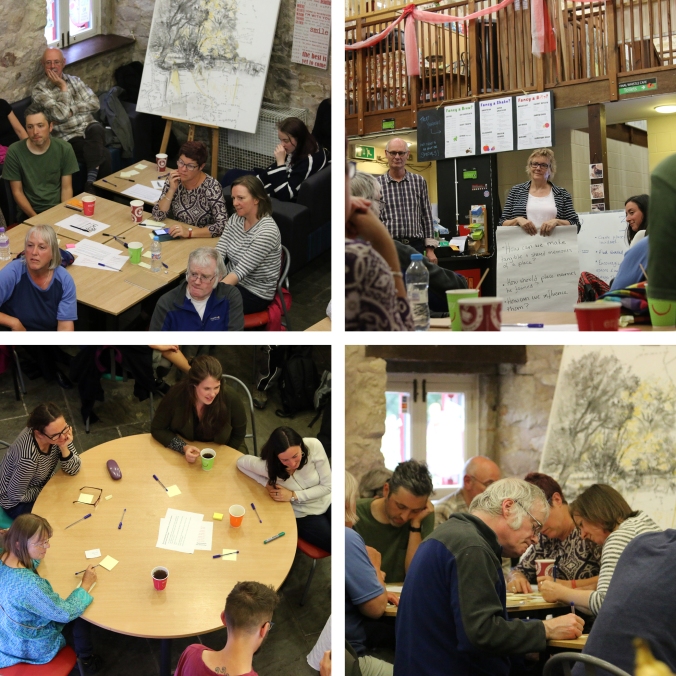
The first Expanded City Network event, Traces of Place, was held at the Final Whistle café in Preston on 4 July 2017, and considered the question ‘What makes us feel at home?’. Writer and artist Lauren Velvick looks at the event in the wider context of The Expanded City project.
As I’ve noted previously in these posts, the methodology of this second year of The Expanded City is subtly different to the first, but continues to move at a gradual and careful pace. Much of last year’s research was conducted if not in isolation, then individually, with each artist conferring with the city. This year, it was proposed from the start that each artist would design one public event, where a second speaker would be invited to reflect on their own research . In the first of these events, Traces of Place, Olivia Keith invited Director of Lancaster Arts, Jocelyn Cunningham, to form and facilitate an information-gathering workshop adapting the techniques that Keith has developed through her large-scale map drawings. In line with the wider project’s strategy of tentative research, rather than an insistence on drawing premature conclusions, this event focussed on listening rather than telling, and asking rather than knowing.
At the beginning of Traces of Place, Cunningham emphasised the difference between dialogue and listening, encouraging the audience to approach their conversations as vehicles for internalising and remembering what other people think, with nuance and sincerity if not total accuracy. The process of the workshop meant that participants were required to write down what they heard, rather than what they thought to begin with. It is interesting for me, as a writer and critic, to see this approach articulated as though it is unusual, when for the most part my role is to recount what was said or done by others, as I’m doing here. As an outside observer, this leads me to consider where interpretation might fit within the process outlined, and whether it can be understood as a conscious action at all.
In collecting the reflections of the participants, who were introduced to Keith’s project and aims and then invited to respond, Cunningham warned against the temptation to ‘shoehorn’ ideas together, emphasising the importance of the subtle differences in individual experience and encouraging participants to search for an intertwining ‘golden thread’. The responses were collected and iterated back to the audience with a gravitas that betrayed Cunningham’s training as an actor, and gave the participants’ disjointed memories of each other’s statements a poetic cadence:
Home is just a roof over my head
I like the walk to town more
Repeats schedules
Walks
And surrounds
Walks
And notes
And surroundingness
I know people
By the names of their dogs
Some maps are not very useful
Shopping areas
For people who don’t like shopping
Although a proportion of this event was given over to cautioning the participants against rushing towards conclusions when further questioning is pertinent, Cunningham did enumerate some outcomes, albeit with a light touch. Particularly fascinating for me was how these mirrored my own findings from the project’s first stage; affirming a simultaneous desire – or need – for both privacy and community, what Cunningham referred to as a ‘meta-theme of internal versus external’. The participants also raised issues that problematise the narrative of Olivia’s project, but in a way that is vital and generative, with one woman insisting that we must acknowledge the fact that local history and heritage isn’t of interest to everybody, and that perhaps naming for the future is as important as ‘what makes it through’ from the past.

Photos: Lucy Cattano and Katie Billsborough